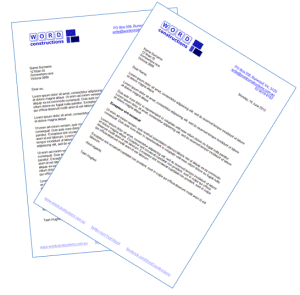I hope you find my writing and business tips and observations useful. My business and blog are dedicated to helping businesses communicate clearly and reach their potential.
Read, subscribe to my newsletter, enjoy!Tash
Correct details in tests are critical
I came across another example of errors in details being an issue.
Our daughter’s school sent out an email including ‘(1 of 2)’ in the subject. The attached pdf explained they were testing the communications system for parents so we should expect two emails – if only one arrives, contact the school.
Testing communications seems like a good plan and the test seemed simple enough.
Then I got a second email which referred to being the first email of two and had the same attachment. Was it an error to get this email twice or did they accidentally send it twice? Should I reply to say I got it twice, possibly like hundreds of other parents, or give them a chance to explain the duplication first?

Responding to a mistake can lead to a flurry of emails – avoiding that is one good reason to check details before hitting send!
Then, I got a third email asking me to log into the school’s site to read a letter. The letter was the same attachment as in the original email (which clearly states ‘this is the first email and please contact us if you don’t get a second one’).
Which detail is wrong – the letter stating a second letter was coming or the sending of the same letter twice?
Where does that put their test?
On one hand, I got both types of email so the systems are working and my contact details are correct.
Do they have my email address in the system twice so I will get two versions of every group email they send?
Was it human error to get the same attachment in the second email type or is that a failure of the system?
I can not reply as I got both emails or I can reply and explain I got three emails and the same attachment.
Which do you think will help their testing process more? What would you do?
Get the details right
Are you a details person?
Many people are bored by details (probably all of us really – we just like details in some things, not all things) and that includes details of grammar and good writing.
You can’t convince me with poor attention to details
I received a letter a few days ago.
I like getting letters, and it doesn’t happen as often now we have so many electronic options available to us. So it’s disappointing when the letter turns out to be spam or a scam rather than something interesting.
This particular letter I recognised as spam straight away as I’ve received rubbish from this group before (and so have clients who luckily ask me if it is legitimate before acting).
However, standing in the sun was nice so I actually read their letter and found numerous reasons to not act as they wished.
- they were using an email address I have never used so obviously made it up – to convince me you are credible, use my real email address
- they missed the .au in my email and website addresses – and coming from an Australian company wanting to promote me in an Australian directory makes it even more pathetic to my mind. It wouldn’t take long to look at my website to discover the .au in the URL
- it was sent to my home address but addressed to Word Constructions – a detail that made me instantly suspicious anyway.
- paragraph one includes “This now includes additional subscriber benefits listed below” which is grammatically poor; paragraph three includes “… entitle you to additional subscriber benefits (see below).”
However, the letter does not contain any subscriber benefits. - a smaller detail is lack of consistency such as “The Internet reaches 15 million… (internet analysis…” (Internet or internet – they need to choose one and list that in a style guide)
- multiple sentences were missing words or just didn’t make sense – one will be discussed and improved in my March newsletter I think!
- two sentences in a row ‘kindly’ requested me to do something – is it kind of me to sign a form to (supposedly) get promotion via their directory?
Businesses need to watch the details
Get the details right and people are not distracted by the mistakes – meaning they can focus on your call to action or message.
[Tweet “Get the details right and people are not distracted by mistakes”]
Get the details wrong and people doubt your professionalism and worry whether you pay attention to details when they are paying you. That is, if you throw together a letter instead of putting effort into every word of it, will you also rush through fixing my car, cutting my hair, building my house, designing my website and so on?
It’s nice to think people will ignore errors because we’re nice people with good intentions.
But first impressions count and if those incorrect details are the first thing a potential customer sees, it can be enough to give your competitor the job.
So how does your business avoid errors in the details?
How does your business react to potential suppliers if they get details wrong?
You can write great client letters
I wrote about an officious bank letter that resulted in me closing my account.
There was more to that letter for teaching about good letter construction, so here are some tips for you…
- the letter was on two pages
This was unnecessary, unavoidable and can really annoy readers. It looks longer so is off-putting and is just a waste of effort. With better writing it could easily have been shorter and their letter format included a lot of wasted space. - one line of the letter contained only ‘if:’
It is best practice to avoid a single word on a line (designers call this as leaving orphans and widows), especially such a short word - every number in the letter was written as ‘three (3) years’
Frankly, people can either read or they can’t, so ‘three’ or ‘3’ is sufficient – adding both is unnecessary and looks wrong - first sentence is 3.5 lines long…
It was simply too long, both visually and for comprehension. When in doubt, go for shorter. - lack of clarity throughout the letter
The letter went from the consequences to the definition to the impact for me so it was hard to follow – I had no reason to care about the consequences until I knew the relevance and definition!
Remember to explain the relevance of any information first. They could also have improved it a lot by using a sub-heading for the full definition of inactive account – I could skim that section or read it for details without feeling confused. - a missed personalisation opportunity
The letter stated ‘your account referred to above’ – it’s not hard to mail merge (and they were already merging in my name and address!) so why not use ‘your xyz account’ which is more personal and easier to read - an entire section was irrelevant to me
why include a long paragraph, including two bullet points, on offset deposit accounts when I don’t have one? Setting up a conditional rule on this paragraph would be easy to do so it only goes to relevant clients. Or at least have it under a sub-heading so it doesn’t clutter the main letter and distract from the meaning
A drop of honey in your writing works
Some years ago, I opened a saving account with a higher interest rate for the proverbial rainy day. I haven’t used that account much for some time but received a letter from that bank that I wanted to share.
Threatening feel
With opening words ‘Inactive account’, the letter launched with a long paragraph about money in inactive accounts being transferred to ASIC. The paragraph ended with a ‘by the way, the Government recently changed the inactivity period to 3 years from 7 years’ message.
It went on to define in active accounts.
Followed by a sub-heading “Your inactive xyz account”.
At this point I was angry because I hadn’t been told about the change in law nor that my money would be transferred to ASIC so “how dare they do that”.
The letter then mentioned I could prevent the transfer by using my account before the end of January.
Why not tell me that first as it is actually the most important thing for me to know?
And encouraging me to make another deposit is surely in the bank’s best interests, too?
Why let me get angry and annoyed rather than show me they are trying to help my keep my money?
The harsh letter made me uncomfortable, and as I only had a small amount of money left in there, my response was to withdraw all my money and close the account myself.
This is obviously a necessary letter for banks, but I think they are missing a relationship building and marketing opportunity to write it in such harsh terms.
Even if most people still closed their accounts, they would do so without negative feelings towards that bank…
It could have been personable and helpful
In contrast I recently wrote a letter for a client along similar lines.
That letter effectively read:
You haven’t made a contribution for some time so your account is about to be classed as inactive.
If you make a contribution by xx, your account will be reactivated. Otherwise, your account will have to be closed.
Another option would have been to write:
Did you know that any account without transactions for 3 years are classed as inactive? And that we have to transfer money in inactive accounts to ASIC?
To avoid this for your account, please make a deposit or withdrawal by xx.
Or they could have focussed on the change in law as important news:
Did you know it’s been nearly three years since you used your account?
The Commonwealth Government recently changes the law so accounts are classed as inactive after 3 years rather than seven. That means your account could soon be classed as inactive.
By law, we must transfer money from inactive accounts to ASIC.
Of course, you can reactivate your account by making a deposit or withdrawal before xxx.
Which version would you prefer to receive?
* Images courtesy of kozziHere comes Santa Claus…
As always, I am involved with Love Santa at this time of year – I write letters to Australian children to help out that busiest of men, Santa Claus (Father Christmas or St Nick). I love doing it, and am honoured Santa entrusts this important task to me each Christmas.
You’d think that Santa is famous enough that people could spell his name, but unfortunately I often see it misspelt so it inspired this week’s Monday Meanings!
Claus – Santa’s surname/last night/family name; a first name for boys in some countries
Santa Claus is a very generous man.
Clause – part of a sentence (including a subject and its verb) or a legal document
According to clause 23.4, all pilots must avoid flying at sleigh height on 24h December.
Claws – sharp nails growing from the fingers or paws of some animals, especially cats.
Santa’s kitten sharpens his claws on the couch.
How to remember these three words? Well, the easy one is relating claws to jaws as both are sharp and potentially dangerous!
Then just take the easier/shorter word for Santa as he is uncomplicated (magical and special, but uncomplicated!)
One little letter…
One little letter can make a huge difference.
I have just come across an example of why it is critical to proof read everything before you publish it, and why attention to details such as spelling and grammar are important.
Actually, I first saw this site about 8 months ago and they still haven’t noticed or corrected it. I had forgotten it but for my amusement I’m glad it was still there!
In the header of every page of the site, they have used an a instead of u in their tagline. One little letter could be a simple typo, of course, but your tagline and header are the first things people notice! And in this case, it doesn’t look like a typo as it makes a real word which gives a VERY different meaning.
The tagline in the header is “Pass a drag test no sweat” which instantly brings to mind men dressing as women (testing to see if they are real drag queens is perhaps unusual but I guess we don’t want people pretending to be in drag?)
Elsewhere, they use the tagline “Pass a drug test no sweat” which related to the fact they sell “products is removing unwanted substances from your body and provides for quick detoxification of your organism.”
I’m not going to touch the rights and wrongs of passing drug tests this way, but it is clear that there is a huge difference between drag and drug.
So check your work carefully and don’t just rely on spell checks to get your work correct.
Use your words wisely!
Capitalising job titles
A few months ago someone asked me (as a comment in a blog post) about capitalising the words in a job title.
My response, in summary, was that job titles don’t need to be capitalised although it is not technically wrong to do so. The exceptions being a title as part of a name (e.g. Doctor Jones) and someone in a key national role (e.g. Prime Minister, Treasurer).
I also noted that some companies list capital letters for extra words as part of their corporate style guide. Thus, we get companies writing about their Managing Director, Marketing Manager and Company when managing director, marketing manager and company would be perfectly acceptable and easier to read.
While I respect that each company can set their own brand, what annoys me is the inconsistency of such capitalisation. That is, most (maybe all!) of those companies would quite happily write about Jack the receptionist, Simone the cleaner and Justine the forklift driver while referring to Craig the Chairman and Mary the Operations Manager.
It annoys me because it is inconsistent (and therefore distracting and harder to read) but also because I find it disrespectful. Using capital letters is usually done as a sign of respect to the person in the job – does a receptionist, cleaner or forklift driver not deserve respect as well? And for anyone who says a Marketing Manager is more important than a receptionist, I ask if you could manage a busy switchboard or how you view companies you call where the receptionist doesn’t do a good job.
So, while I prefer to not use capitals for titles, if you do capitalise titles please be sure to capitalise them all.
Capitals change the meaning
It’s Monday but I’m going to do the Monday Meanings post a little differently today in honour of Anzac Day on Saturday.
Sometimes, a capital letter can change the meaning or significance of a word.
Digger: an Anzac soldier
The Diggers proudly walked off the ship in Melbourne.
digger: someone who is digging or regularly digs
Sitting in the sandpit, the digger created a moat around his castle.
The general rules for the use of capital letters obviously still apply, as does the annoyance of over using capitals. For the above example, I added a capital letter to a regular noun to make it a proper noun as I could also do for words such as Mother/mother, Father/father, Nurse/nurse and Captain/captain.
Sales emails
There was no reason for me to read some spam I received recently, but it was top of my spam folder and I glanced at it. The subject was “USB Inquiry” and the content was five paragraphs telling me how they could sell me USB keys for my customers (with my logo and presentation on the USB key).
From that email, I spotted a number of tips for writing a good sales letter/email:
- make your subject match the content. I wouldn’t have read the above email by the subject as it appeared to be asking me about USB keys which I don’t sell. A better subject would have appealed to my need for a USB key rather than asking me about them (inquiry meaning question)
- check the relevance of your offer to the person receiving the email. Why would I buy USB keys from the USA? There are perfectly good USB keys in Australia and they would cost me less in time and freight. If I’m wrong, they could have explained that in the email. The .com.au part of my web address is a clue that I am not in the USA…
- relate the offer to the person. A USB key could be useful for me, but a more targeted response would have suggested I put client documents on a branded USB key instead of a plain disc or compile some templates or articles to hand out to prospective clients. They just assumed I did presentations that have notes suitable to a USB key. A serious sales proposition would be based on my needs, not a generalisation
- I’ve said it before, but use the person’s name – it is the most important word in their language. “Hello,” isn’t good enough and finding a name off a good website isn’t that hard.
- The paragraphs start ‘Could you…’, ‘My company…’, “We can…’, “please visit…’ and “Thank you…’ Every starting point is asking me to do something or talks about them. Where’s the appeal to me, the message that I am going to benefit from this purchase?
- The email opens with a request to direct her to the marketing person but then continues as if I am the marketing person. If you request a name, wait for that answer or at least link into the remaining information (e.g. ‘We want to contact your marketing person to explain…’)
- Check your sentences say what you want them to. This email included this gem “We are not offering rush production services, and custom shape USB flash drives, you tell us the shape you want your flash drive to be, we will make if for you!” So we don’t offer custom shaped drives but we will make any shape you tell us – doesn’t inspire a lot of trust…
- The email finished with “We offer non – profit organizations, schools and charities a discounted rate, so please be sure to mention that for even better pricing.” That’s nice, but as I’m not a school, charity or non-profit group it doesn’t help me much; then again, the email says mention their discounted rate for better pricing and I could mention it easily enough! The lesson again is make the message relevant and clear.
- Ensure your contact details are easy to use. This woman gave me a phone number without any area (or country) code and no address so how can I ring her? I’d bet that if I dialed it exactly as is I wouldn’t get her!
- Build trust. This email came from an email address that doesn’t match the email given in her signature or the URL she includes which makes me wonder why she didn’t use the company email address and makes me very suspicious.
Of course, even had she written a much better email, I still wouldn’t buy from her as I hate spammers and she didn’t meet legal requirements of including her address. Would you have ordered any USB keys from such an email? Had she followed my tips do you think you’d have been more likely to buy from her?
At least you know what to avoid when you next write a sales letter!
*Photo courtesy of 123rf






Recent Comments